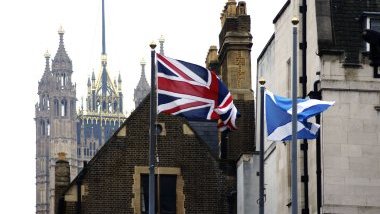Scotland’s options
Scotland’s position is particularly salient considering it diverges significantly from the rest of the UK. Here, one question remains unanswered: will the Scottish nation be forced out of the European Union against the will of its people, and against the will of its Government? Michael Russell, Scotland’s chief negotiator in the Brexit process, has been working tirelessly to ensure a favourable solution for Scotland. However, considering the complex nature of the upcoming negotiations, the Scottish Government must be prepared for all possible scenarios.
At present, three options have been identified:
- Undifferentiated option: fully complying with Westminster
- Differentiated option: Scotland negotiates its own relationship with the EU, which diverges from the Westminster’s position
- Scottish independence: Scotland holds a second independence referendum and negotiates its relationship with the EU as a sovereign country
Better together but different?
If one believes in the United Kingdom staying together, then a differentiated option is surely the most logical. It would be a solution that the UK government could potentially welcome, and that would be consistent with how the UK has developed. The current political system already involves devolution, or rather, conceding political competency to Scotland over certain policy areas. This has naturally been driven by differentiation, i.e. the idea that we can have different policy solutions for different parts of the Kingdom. Yet, we have a Westminster Government that, so far, has refused to consider a differentiated option for Brexit. One can only consider the rejection of such a differentiated option an act of self-harm against the ‘Better Together’ idea.
Implications for devolution
A differentiated option would, in any case, have strong implications with regard to devolved competences. While we can optimistically hope to negotiate more devolved powers for Scotland, there is no guarantee of this. Policy areas that are almost entirely under EU competence at the moment would have to be re-negotiated internally post-Brexit, and could be transferred to the Westminster Government rather than the devolved administrations, potentially leading to the erosion of some existing devolved competences. One example of this would be agriculture, which is both a devolved matter in Scotland, and an EU competence. In practice, this means that the EU drafts regulations, but the Scottish Government gets to decide how such regulations are implemented. With a differentiated option, the power to draft and implement agricultural policy would have to be re-negotiated with Westminster post-Brexit.
Immigration and security
We must also keep in mind that Scotland has its own stance on many matters that are currently not devolved. On immigration, the Scottish Government concedes that we cannot have free movement of goods without allowing for the free movement of people. Our economy is fuelled by people who come to Scotland from other parts of the EU to work. In fact, some industries in Scotland would not even exist without workers who have migrated. Scotland’s population is decreasing rapidly and we need people for our labour force. No country has a completely open door of course, but the discourse in Scotland is one of positivity when it comes to immigration – there is an acknowledgement that immigration is good for us, and that a more open policy on migration would be beneficial to Scotland.
When it comes to security, the debate between Scotland and Westminster is just as heated. Not only does the Scottish Government oppose the use of nuclear weapons, and the fact that we are forced to store these in Scotland, but there is also a real sense that solidarity is key when it comes to defence. The EU is seen as a force for good that has maintained peace in Europe since its inception.
Trade prospects
On top of this, there are also different views on future trade options post-Brexit. The Scottish Government does not believe that the World Trade Organisation would be beneficial for Scotland. First, unlike the EU model, the WTO is not a free trade organisation, there are high fees and tariffs; second, it is an incredibly complex organisation that would require a lot of time, money, and unfavourable compromises. There are 160+ members to negotiate with, which is far more than the 27 members of the EU. Moreover, its policies are not good for Scotland’s economy; for example, the WTO is strongly against subsidies for farmers, which would not benefit our agricultural industry. The reality is that there are no huge untapped markets waiting for us. The EU has a great trading relation with countries around the world - we are already a great trading nation.
Differentiated option: can it be done?
All in all, a differentiated solution would be needed in order to accommodate these diverging positions while keeping the Kingdom united. But how realistic is this option? Naturally, that will depend on the outcome of discussions, both with the EU and Westminster. In Brussels, there seems to be a lot of goodwill. Many are deeply concerned with the prospect of denying EU citizenship to people who voted overwhelmingly in favour of staying in the EU, and there is an acknowledgement that this is not in the interest of European solidarity. However, decisions will be guided by the constitutional due process; how this process is interpreted will be key. Unfortunately, there is in fact very limited knowledge about the process as this is an unprecedented scenario.
The case for independence
The option of Scottish independence also remains firmly on the table, particularly if Scotland is unable to negotiate a differentiated position. Some have pointed to the irony of supporting independence from the UK but not from the EU. However, we must keep in mind that these are two different types of entities. Under the United Kingdom, Scotland does not exist as a sovereign power. The EU, on the other hand, is essentially a confederal organisation, into which members, who are independent states, enter of their own free will and choose to pool aspects of their sovereignty.
At present, Scotland’s interests are not directly represented in the EU. So long as it remains within the apparatus of the UK, Scotland does not have a say in EU discussions, even when we are directly affected by the topic; one prominent example of this is fishery, a policy area that many in Scotland are unhappy with. Indeed, some who voted to leave the EU did so because they opposed EU fishery policies. One advantage of Scottish independence from the UK while upholding membership to the EU would be the capacity to influence these policies from within.
An uncertain future ahead
Moving forward, the only thing we know for certain is that we cannot predict the outcome of these negotiations. If 2016 has taught us anything, it is that politics may surprise us beyond belief. With the aim of preparing for all possible options, the Scottish Government recently published a paper on their preferred differentiated option. The initial reaction of Westminster was negative, but the negotiation is still only about to begin.
The Scottish Government also plans to publish a short paper that will inform the constitutional process in Brussels. This paper will give the story of the Scottish constitutional journey, and will explain what we believe constitutional due process to be. Moreover, a consultation on an independence bill is currently on-going. We can hope that goodwill translates into action, but we will have to wait to find out.



1. On 27 December 2016 at 20:15, by Osiris Messias Araujo da Silva Replying to: On the brink of Brexit: Scotland’s future in Europe
Replying to: On the brink of Brexit: Scotland’s future in Europe
Well done dear Carol. I personnaly agree on your point of view regardind to Scotland’s position about Brexit UK decison. Hopefully expect Mr. Michael Russell, Scotland’s chief negotiator in the Brexit process, come to a favourable solution for Scotland. Best regards. Osiris Silva, Manaus, Amazonas - Brazil.
2. On 29 December 2016 at 09:52, by Peter A Russell Replying to: On the brink of Brexit: Scotland’s future in Europe
Replying to: On the brink of Brexit: Scotland’s future in Europe
Incredible not to mention 2014 referendum which voters rejected Scottish independence.
3. On 29 December 2016 at 13:45, by Juuso Järviniemi Replying to: On the brink of Brexit: Scotland’s future in Europe
Replying to: On the brink of Brexit: Scotland’s future in Europe
Peter: I believe that’s justified, as the June 23 referendum changed the circumstances rather profoundly in Scotland. Ahead of the Scottish referendum in 2014, it was assumed that the best way for Scotland to secure its membership of the European Union would be by remaining a part of the United Kingdom. Now, however, the likelihood of remaining a part of both the United Kingdom and the European Union is approaching zero, as the Westminster government has repeatedly said that they won’t accept a differentiated Brexit.
If 55% of the electorate wish to remain a part of the UK, and 62% wish to remain in the European Union, but there cannot be two unions, asking the public to choose is a valid option. I recognise that there are caveats, for instance the fact that one can exaggerate the simplicity of re-entry to the EU, and before a new independence referendum the public discussion needs to be based on facts (something that didn’t happen before the June 23 referendum). Therefore, I believe that a referendum, and importantly an informed one, is needed to bring the debate to a reasonable conclusion.
Follow the comments: |
|
